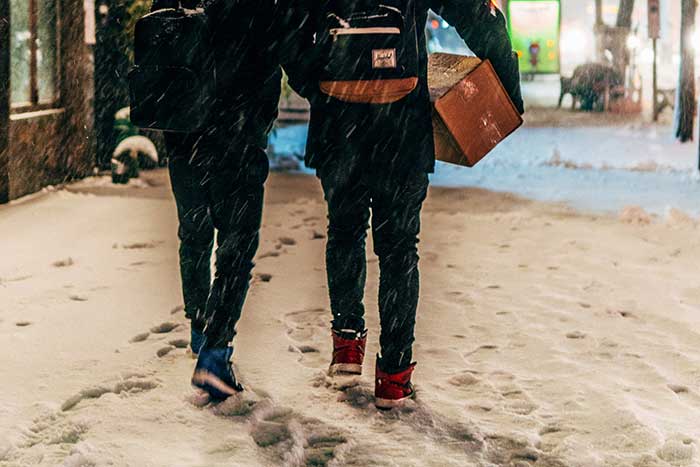
@mmajewski
Property owners and landlords have a legal obligation to keep their premises safe for all visitors, especially in the winter when slip and fall accidents are more likely to happen. There’s a myriad of things they can do to winter-proof their properties to prevent slips, trips, and falls on snowy or icy surfaces in order not to get sued into oblivion.
How to Prevent Slips and Falls in Winter
There are several general safety tips you can use to make your premises safer for visitors when temperatures fall below the freezing point:
· Ensure that your property gets enough lighting, especially in winter; ensure that every corner of your property receives enough light, including parking lots, sidewalks, stairways, and other locations that might get wet or slippery.
· Remove ice and snow from parking lots, driveways, sidewalks, dumpster areas, and stairs as soon as possible.
· Use flooring materials on stairs and floors that offer enough traction and keep the risk of slips and falls down.
· If a spill has occurred, mop it up immediately; you don’t want it to turn into ice and become a slip-and-fall hazard.
· Get rid of all uneven surfaces such as cracks, bumps, and potholes on the heavily trafficked areas on your property.
· Ensure that each stairway and ramp have a well-fastened handrail installed.
· Clear walkways of any obstruction that might turn into a slip-and-fall hazard.
· Before temperatures drop below zero, winterize, drain, and shut down the sprinkler drain system; if you fail to do so, leaks might occur, which can turn into hazardous icy patches; the pipes might crack too.
· Ensure that the rain or snow that gets collected in gutters is not channeled into the driveway, parking spots, or walkways unless you want it to freeze and turn into ice when temperatures sink below zero.
· Don’t allow black ice to accumulate on your premises.
What Are My Legal Obligations?
As a property owner or manager, you are required to exercise reasonable care when taking care of winter weather hazards that might lead to a slip and fall on a highly trafficked spot around your home or business. This legal duty of care includes the removal of ice and snow as soon as possible, along with periodic inspections of your premises to prevent slip and falls from happening on the property.
If you outsource this duty of care to a third-party such as a plow company, that third-party will be liable for any slip and fall accidents happening on your property if they fail to do their job correctly. One such company, just like you, is legally obligated to anticipate slip and fall hazards and address them within a reasonable time.
The operative word here is “reasonable” as the duty of care is reasonable and so should be the property owner’s and manager’s conduct. A slip and fall victim will have to prove that the property owner’s behavior was not “reasonable” under the current circumstances to win compensation for their injuries and pain and suffering.
However, what people might understand by “reasonableness” largely varies depending on each person’s home state. What you might be entitled to reasonably expect from a homeowner in North Dakota is very different from what you might expect from a homeowner in, let’s say, Arizona.
If a slip-and-fall accident has occurred on your property, you can get away with it if you live in a state that abides by the “natural accumulation” rule. Under this rule, a property owner cannot be held responsible for a slip and fall accident on their premises if the accident happened in connection to the natural accumulation of ice or snow and the homeowner hasn’t tampered with the accumulation.
In Conclusion
Winterproofing your property to prevent slip and falls from happening on your premises can save you a lot of headaches, especially if the potential victim is eager to sue. However, getting compensation for a slip and fall accident is not that easy if the insurance company is uncooperative or if the entity having the legal duty of care is a government agency. At least in those two cases, slip and fall victims need to first learn how to win a slip and fall case in NY or in other similar states before hiring an attorney and engaging in a full-blown legal battle.


